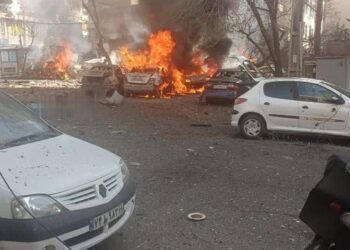Through sit-in protests and a searing memorandum to the Home Minister, the Kuki-Zo women demand answers, dignity, and constitutional protections — exposing systemic neglect and brutal suppression.
BY PC bureau
In a moment of urgent defiance and sorrow, women from the war-torn Kuki-Zo community gathered across tribal regions of Manipur on May 31 under the banner “No Justice in Fear”. At the heart of the protest was a detailed and scathing memorandum submitted by the Kuki Women Organisation for Human Rights (KWOHR) to the office Union Home Minister Amit Shah, accusing the Indian state of enabling, ignoring, and exacerbating ethnic violence against their community.
The memorandum — handed over as part of a coordinated Sit-In protests in Kangpokpi, Churchandpur, Chandel and other tribal areas — presents a disturbing portrait of ongoing injustice in Manipur: one where rule of law is selectively applied, tribal safeguards are stripped, and impunity is granted to known perpetrators of terror. It offers not only a cry for help but a stern indictment of silence and complicity from state and central authorities.
The memorandum is a documentation of state neglect, legal manipulation, and violent targeting of the Kuki-Zo community that has, according to KWOHR, pushed the community to the brink of collapse.
A central focus of the memorandum is the selective law enforcement by central investigative agencies such as the National Investigation Agency (NIA) and Central Bureau of Investigation (CBI). While tribal men are allegedly being picked up without due process or credible evidence, even those named in hundreds of FIRs — from Meitei radical groups like Arambai Tenggol and Meitei Leepun — remain untouched.
Memorandum submitted to Union Home Minister @AmitShah by Kuki Women Organisation for Human Rights (KWOHR) on 31st May 2025.
KWOHR urgently appeal to end arbitrary arrests, ensure justice for Kuki-Zo victims and uphold constitutional guarantees.@NIA_India @CBIHeadquarters @ANI… pic.twitter.com/wKinpDeglt
— Sumkawn (@Sumkawn) May 31, 2025
The memorandum singled out Korounganba Khuman, commander of Arambai Tenggol, accusing him of masterminding brutal attacks in Kangvai, Churachandpur, and Langol. Despite NIA cases registered against him, Khuman and his cadres allegedly roam free, continuing their reign of terror. Meanwhile, Kuki-Zo civilians — often with no links to violence — face arrest, torture, and indefinite detention.
READ: Saxena’s Delhi Makeover: Three Years of Epic Revival
“You have weaponized your agencies and criminalized our identity,” the women write. “The scales of justice are no longer blind — they now weigh caste, ethnicity, and political convenience.”
KWOHR didn’t stop at law enforcement. It accused the state government — led by Chief Minister N. Biren Singh — of overseeing a systemic dismantling of constitutional safeguards and allowing the collapse of neutral governance in tribal regions.
Key accusations include:
Stripping of tribal officers: Tribal police personnel and administrative officers were removed from command positions. In their place, Meitei officers were appointed — many of whom, the memorandum alleges, are directly or indirectly complicit in violence against Kuki-Zo communities.
Jurisdictional manipulation: Tribal villages such as Kuki-dominated Moreh were forcibly brought under Meitei-dominated police jurisdictions, violating the Manipur Hill Areas District Council Act, 1971, and the spirit of constitutional autonomy for tribal regions.
READ: First Time India Admits Loss of Jets in Clashes with Pak
Looting and weaponization: The document alleges that radical Meitei militias looted over 6,000 weapons from state armories — arms that were subsequently used in attacks against tribal civilians, with no real state effort to recover them.
Manipur: KWOHR (Chandel) condemns arbitrary arrests of Kuki-Zo people by @NIA_India & @CBIHeadquarters & slams selective justice & impunity for Meitei extremists. Demands end to bias, arrest of perpetrators, & justice for Kuki women.
🗓️ Sit-in protest on May 31
📍Longja Village pic.twitter.com/L6a2eD7i06— Kuki Inpi Chandel (@KukiInpiChandel) May 31, 2025
A Parallel War on Women: Gendered Violence and Disinformation
One of the most harrowing sections of the memorandum focuses on sexual violence and rumor-driven assaults targeting Kuki-Zo women.
According to KWOHR, coordinated fake news campaigns falsely accused Kuki-Zo men of raping Meitei women — a claim police later refuted. However, the damage was done: mobs descended upon tribal areas, and Kuki-Zo women became targets of mob stripping, molestation, rape, and public humiliation.
A Second-Class Citizenship in the Making
The memorandum accuses the state of not only weaponizing security forces but also erasing tribal rights from within. Civil services, police, and administrative systems — already skewed by years of imbalance — have allegedly been turned into tools of persecution.
“When our villages are burned, our people are arrested; when we defend ourselves, we are branded as insurgents; when we cry out for justice, we are accused of inciting unrest.”
This systemic targeting, KWOHR asserts, is pushing the Kuki-Zo population toward a state of permanent fear, displacement, and constitutional invisibility.
In its closing appeal, KWOHR demands:
Immediate halt to arbitrary arrests of Kuki-Zo individuals by NIA, CBI, or any central agency without irrefutable evidence.
Formation of a neutral judicial commission to review all cases involving Kuki-Zo detainees and examine patterns of targeted arrests.
Swift prosecution of all those involved in sexual and ethnic violence — without regard to caste, creed, or political connections.
Restoration of tribal safeguards, including the implementation of the Hill Areas Committee and the Manipur (Hill Areas) District Council Act, 1971.
Immediate withdrawal of biased Meitei officers from tribal districts and the reinstatement of Kuki-Zo personnel to maintain impartial governance.
A Cry Echoing in the Silence
In Chandel, Manipur, KWOHR’s district unit also condemned the ongoing arbitrary arrests and what it terms as “selective justice” against the Kuki-Zo community in Manipur. In a press release, the organisation denounced central agencies like the NIA and CBI for what it describes as unlawful detentions of innocent tribal individuals, calling it a gross abuse of law and human rights.
Sit-In Protest Held Under the Banner “No Justice in Fear”
As part of their protest, KWOHR organized a peaceful sit-in demonstration at the Wall of Remembrance in Longja Village, Kana Area, with the theme “No Justice in Fear, Protest Against Selective Justice by NIA & CBI.” The organisation emphasized that this action was necessary to shine a light on the impunity enjoyed by perpetrators of violence against the Kuki-Zo community, particularly Meitei extremist groups.
The press release outlines alarming incidents:
Brutal Violence Against the Kuki Community: Including killings, arson, and widespread destruction allegedly carried out by groups like Arambai Tenggol.
Targeting of Women: Kuki women have reportedly been subjected to rape, sexual violence, and other forms of brutality, with perpetrators facing no consequences.
State Complicity: KWOHR points to the now-infamous Biren Singh voice tape as evidence of government complicity in the hate campaign against Kukis.
Impunity for Extremists: The release names individuals like Korounganba and organisations like COCOMI as openly promoting the annihilation of Kukis while enjoying state protection and impunity.
The group asked a searing question: “Is the law only for the weak and victimized Kukis? Why does the law fail to be hard and rigid on Meiteis, who are the perpetrators of genocide?”












